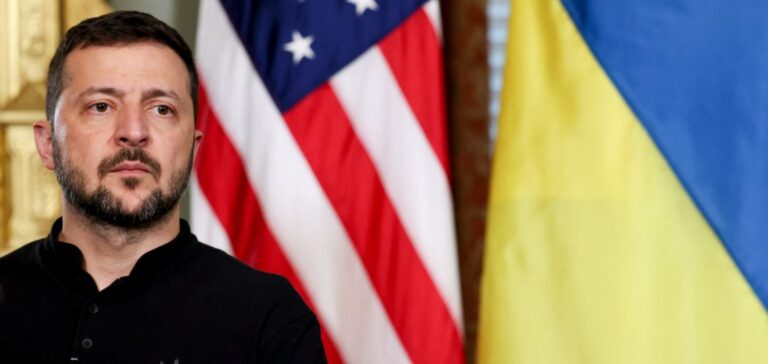Ukraine currently finds itself at a strategic crossroads, where its geopolitical decisions will have a determining impact on its economic and military future. The country holds increasingly sought-after natural resources, notably rare earths, essential for renewable energy, military technologies, and the global energy transition. The choice the Ukrainian government makes between the influence of Europe and that of the United States could well redefine the balance of power in this strategically important region.
Rare Earths: A Strategic Resource for Ukraine
Ukraine is one of the richest countries in rare earths, essential elements for the manufacturing of components used in renewable energy, lithium-ion batteries, and military technologies. According to estimates, Ukraine holds about 12% of the world’s rare earth reserves, particularly in regions such as Donbass and the Crimean Peninsula, whose mineral wealth remains under-exploited due to the ongoing conflict. These resources are crucial for the production of semiconductors, used in smartphones, electric cars, and many military and industrial applications. By aligning itself more closely with the United States, Ukraine could benefit from strategic partnerships to capitalize on these resources within a secure framework.
The deal proposed by Donald Trump aims to allow the United States to take a significant share of the revenues generated from the exploitation of Ukraine’s rare earths. In this framework, Ukraine could give up 50% of the revenues from this exploitation, a figure that appears moderate compared to similar practices observed in the natural resource extraction sector.
American Military Presence: Strategic Protection, Yet Contested
The possibility of Ukraine hosting a prolonged American military presence raises concerns, especially from Russia. Such a presence, particularly during times of tension, would constitute a direct threat to Russia’s geopolitical interests. In fact, with Ukraine being on the immediate border of Russia, a partnership with the United States would be perceived as a strategic upheaval in this sensitive region.
Since the Cold War, Russia has always sought to maintain a buffer zone between its territory and external influences, notably from the United States and NATO. The expansion of American military influence into Ukraine would therefore be a development difficult for Moscow to accept, and it could potentially redefine its defense policy in response to this new geopolitical configuration.
That said, Russia might tolerate an economic partnership between Ukraine and the United States, but the idea of a long-term American military presence could provoke an increasingly aggressive reaction from Russia, potentially in the form of economic sanctions or indirect military actions.
Oil Concessions and the Remuneration for Governments: A Model to Follow?
Ukraine could consider oil concession agreements similar to those observed in some countries. For example, an agreement signed in 2014 between a government and a major oil company allowed the latter to exploit natural gas reserves in exchange for a share of the profits. The government receives between 5% and 20% of the revenue generated from the exploitation of these natural resources, while also benefiting from significant investments in local infrastructure.
This type of agreement can allow a resource-rich country like Ukraine to benefit from advanced technologies and secure its economy while ensuring significant revenue. These partnerships also allow states to avoid long-term dependency on a single company or country.
Europe: A Partnership with Limits
If Ukraine looks to Europe, EU membership remains a strategic goal, but it presents challenges. While the EU offers privileged access to its single market, subsidies, and economic support, military security and Ukraine’s rapid reconstruction are not guaranteed in the short term. EU integration involves complex political and economic reforms and generally takes several years, which does not meet Ukraine’s immediate needs.
The EU is also facing its own internal challenges, including differences over managing energy crises and rising geopolitical tensions with Russia. In this context, Ukraine could find itself with insufficient protection in terms of security and energy independence.
A Strategic Choice for Ukraine
The choice between Europe and the United States for Ukraine is not simply ideological. It is driven primarily by economic and geopolitical considerations. By aligning with the United States, Ukraine could secure direct access to its natural resources while benefiting from military guarantees. American military support would allow Ukraine to focus on its reconstruction, benefiting from commercial partnerships and advanced technologies in the green energy and nuclear energy sectors.
The United States, with its technological expertise and military capabilities, would represent a powerful partner in Ukraine’s energy reconstruction, but this would also involve shared sovereignty, which could be disconcerting to some sectors of the Ukrainian population.
Post-Conflict Ukrainian Elections: A Crucial Factor
Post-conflict Ukrainian elections could become a key factor in the evolution of the country’s policy. The possibility of electoral manipulation to steer the country toward closer alignment with Russia or maintain its dependence on the United States remains a realistic hypothesis. The outcome of these elections could redefine Ukraine’s relations with its neighbors, with implications for how its natural resources will be exploited and allocated among the world’s powers.






















